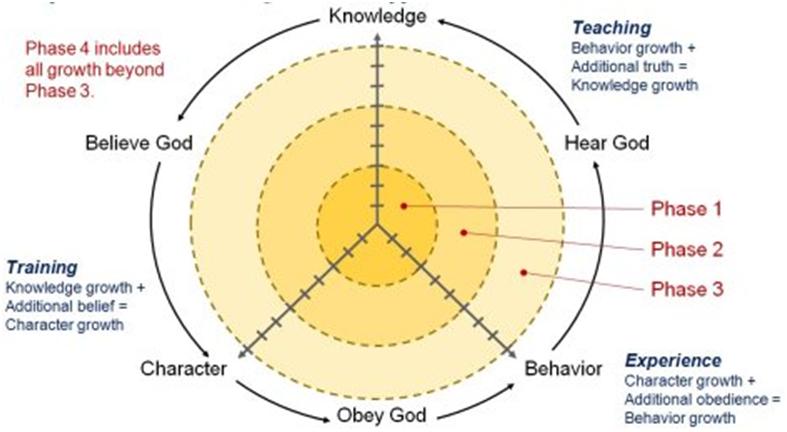 What is the primary purpose of a man? What is their reason for being? Why are we all here? Clearly these are deep questions that have answers only God can fully understand. Though I will not pretend to answer fully in one blog post I do believe God has provided a simple view that will allow us to move forward confidently.
What is the primary purpose of a man? What is their reason for being? Why are we all here? Clearly these are deep questions that have answers only God can fully understand. Though I will not pretend to answer fully in one blog post I do believe God has provided a simple view that will allow us to move forward confidently.
In the book of Ecclesiastes, Solomon struggles to answer these questions. It is the outpouring of a man who wasted the better part of his life seeking significance through what the world has to offer. His recurring mantra is “Vanity of vanities…all is vanity”, because he eventually came to understand that our significance cannot be found in anything the world has to offer. It can only be found in what God has to offer. His final conclusion is revealed in Eccl 12:13, “The conclusion, when all has been heard, is: fear God and keep his commandments, because this applies to every person.” Note that the two directives, fear God and keep His commandments, are inseparable…genuine reference for God includes obedience. Therefore, we may confidently state that our primary purpose in life is simply to demonstrate our respect of God by obeying Him.
But what would God have us to do? What does it mean to keep His commandments? Surely it does not mean simply keeping the law, for the entire New Testament is written with the view that obedience to God includes more than keeping the letter of the law. Jesus himself gives us the simplest answer when he says, “You shall love the Lord your God with all your heart, and with all your soul, and with all your mind. This is the great and foremost commandment. The second is like it, ‘You shall love your neighbor as yourself. On these two commandments depend the whole Law and the Prophets.'” Matt 22:37-40. Earlier in Matthew, Jesus says, “In everything, therefore, treat people the same way you want them to treat you, for this is the Law and the Prophets.” (Matt 7:12). Toward the end of Matthew, Jesus separates those who loved Him from those who did not, and the means by which he knew who loved Him and who did not was the manner in which they treated other people (i.e. other disciples of Jesus). As if to underscore this teaching to the Galatians, Paul later adds, “the whole Law is fulfilled in one word, in the statement, ‘You shall love your neighbor as yourself’. (Gal 5:14)
Based on these few passages plus a number of others, the principle purpose or reason for being of a human is simply to do the following:
Love God and Love Others
Love God
While true, this calling is still very abstract. How can we begin to break it down so we can keep our arms around the it yet make it more applicable to daily life? If we left it here, it would remain a Christian cliché – a mantra that people profess but do not even understand let alone live. Let’s begin by taking each part one at a time, beginning with “Love God”. Loving God can be stated simply, yet more precisely, as the following:
Hearing God, Believing God and Obeying God
That is, we love God when we listen to Him, trust Him and then obey Him. We seek specific truths of God from His Word (The Bible), we believe the truth granted to us, and we live consistent with that belief. If a person does these three things, they express love for God in its purest form. To the extent that strive to know God’s Truth through the bible, believe it to the point that we take action (rather than simple intellectual assent), and actually do what it says is the extent that we love God. When we fail to crave God’s word, believe what we know, or obey what God has said we are being unloving toward God.
Love Others
Loving other people is just as easily misunderstood. Most connect love with emotion; God connects it with sacrifice. A loving person does not simply have warm fuzzy feelings; they let go of what they have for the benefit of others, regardless of how they “feel” about them. The perfect example of love, of course, is Jesus sacrifice of Himself for those that did not love Him first. Consider the statement below as a simple refinement of the “love others” directive:
Joyfully forget yourself and focus on others forever.
There are four components intentionally includes in this phrase: joy, humility, compassion, and perseverance. It is believed that upon inspection of God’s word, loving others can be boiled down to these four major “themes”. We love others when we forget about ourselves (humililty) and focus on the needs of others (compassion) with great passion and contentment (joy) for the rest of our days (perseverance).
That is, we love others when we forget about our own needs to focus on the needs or others, and we are most supremely fulfilled doing this consistently throughout our lives.
Now, let’s connect this to the Iterative Growth Model.

People grow along three dimensions: knowledge, character, and behavior. They grow along these dimensions by hearing, believing, and obeying God iteratively and incrementally. Remember also that we briefly discussed themes. The themes are characteristics that are developed by successive iterations of hearing God, believing God and obeying God and can be considered components of knowledge, character and behavior. For example, if one theme is compassion then I can grow in my knowledge of compassion, belief that leads to compassion, and compassionate living.
Connecting the iterative growth model to loving God and loving others, the hear-believe-obey cycle directly maps to “Loving God” as described above. Similarly, the themes map directly to “love others”. There are four major themes: humility, compassion, perseverance and joy. These themes map directly to our tag line for loving others: Joyfully (joy) forget yourself (humility) and focus on others (compassion) forever (perseverance).
Therefore, because we develop joy, humility, compassion, and perseverance by hearing, believing and obeying God, one may conclude that we love others by loving God! It is by our love for God that we are able to truly love others! And so, the highest calling of a disciple, Loving God and Loving Others, can be slightly rephrased as the following
Loving others by loving God
The significance of this is important. This statement implies that we cannot love others unless we first love God. It is our love for God that empowers and even compels us to love others. More than this, love for others is evidence of a love for God. Hence, Jesus words on Matthew 25 where he states that we have loved Him when we loved others. His statement here is based on this foundational truth that God’s people, those that love him, love others – it’s just what they do. Being a disciple means accelerating this trend…forever.


